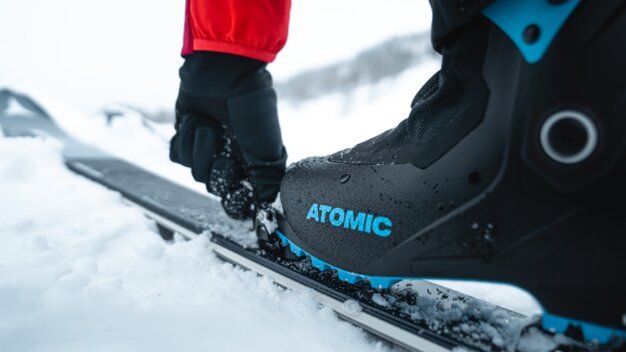
Do you love ski touring but always end up completely exhausted after the uphill part? This might be because you use the wrong technique to skin up the mountain. You didn’t know there was a proper technique to get up the mountain? Then it’s about time you found out how to make things easier for you!
Whether you’re a regular ski tourer looking for tips to improve your skills or a first-timer wanting to get things right from the start, we have provided a list of useful tips for you. To do so, we roped in the guys from ATOMIC who shared their ski touring expertise with us.
How to become a ski touring pro
As we all know, a large part of ski touring involves moving uphill. As this wouldn’t be possible with your regular ski gear, you obviously need the right equipment to skin up a mountain. A basic setup includes the following:
- lightweight touring skis (such as ATOMIC’s Backland 85 or Backland 78 W)
- skins that are compatible with your skis
- touring bindings (such as ATOMIC’s Backland Tour)
- ski boots with walk mode (such as ATOMIC’s Backland Sport or Backland Expert W)
- adjustable ski poles
You already have all of the above? Then up you go! After all, ski touring is simply walking on skis, right? Wrong! If you use the wrong technique during the ascent, you end up putting in twice the effort.
The key to getting up the mountain efficiently is your posture and stride technique. How do you minimise energy waste and maximise downhill fun? How long does your stride need to be, and where do you need to stand on your skis? Find out in our 10 tips to improve your ski touring technique!
TIP #1: Don’t lift your skis between steps!
Again: Ski touring is more than just walking on skis. If you lift your skis between steps as if walking, you lose a lot of energy. Instead, adjust your balance with every move and make sure that your skis stay connected to the snow. Simply pull the ski forward between strides and take advantage of your skins’ gliding properties!
TIP #2: Breathe!
Just like during almost any other sport, your breathing should be in sync with your steps when skinning up a mountain. If you have to stop every few minutes to catch your breath, you’re probably going too fast. Cut down your pace, find your rhythm and breathe accordingly. In the end, a steady pace will get you up there quicker than an erratic faster one!
TIP #3: Look uphill!
When you get tired, it’s a common mistake to start looking down at your ski tips. However, this makes it harder to breathe and can break your skins’ contact with the snow. Keep your upper body straight and don’t hunch over the front of your skis. This will improve your grip and striding efficiency – plus, it would be a shame to miss out on the view!
TIP #4: Adjust your stride!
The length of your strides greatly affects the efficiency of your skinning technique. For low-angle terrain, use longer strides. For steep sections, user shorter strides. To maximise your longer strides, use your hips. If you move them into each stride, you will gain a few centimetres with every step.
TIP #5: Adjust your poles!
Just like adjusting your stride, you should also adjust your poles during certain sections of your climb. For steeper sections, keep your poles at the same length as for skiing downhill. For long, flat sections, increase propulsion by lengthening your poles by five to ten centimetres.
TIP #6: Choose the most efficient route!
It can be tempting to just push through and charge straight up the mountain as quickly as possible. However, for steeper slopes, it can be more energy-saving to go across the hill as it gives your skins better grip. Especially for ski touring beginners, it makes sense to choose the lowest angle to climb the slope.
TIP #7: Use the heel risers on your bindings!
For steeper sections with a gradient of 25 per cent or more, flip up the heel risers on your bindings to increase the height of your heels. This improves the way you stand on your skis, helping you to even out the pressure on your foot. This reduces strain on your calves and makes uphill travel less strenuous. However, save the high riser position for really steep slopes, as it can make your skis feel unstable and force you into a forward-leaning position.
TIP #8: Practice doing uphill kick turns!
For sections with a gradient of 35 degrees and more, it’s useful if you know how to do uphill kick turns. This technique requires you to flip the uphill ski in the opposite direction and swing your downhill ski around with your poles. Kick turns take practice – but you might be glad you’ve mastered them when faced with an icy, steep section!
TIP #9: Don’t overdress!
Choosing the right clothes for ski touring can be a bit tricky. While skinning up the mountain might leave you soaked in sweat, you can quickly get too cold on the downhill part. The solution: Dress in layers and remove/add layers as necessary.
TIP #10: Bring the right tools!
If the snow gets sticky, this can slow your pace down to a crawl. Bring skin wax and a scraper and make sure you keep your skins dry!
INTERSPORT Rent tip
Are you ready to work on your skinning technique? Then why not rent the latest ski touring gear to make your ascent even more efficient?
At INTERSPORT Rent you can find a vast selection of latest-generation ski touring equipment, ranging from skis to boots and poles. Drop by and let the RENTertainers help you choose the perfect setup for your next ski tour!












